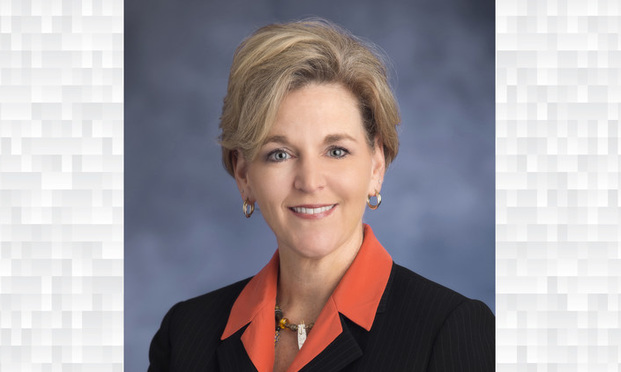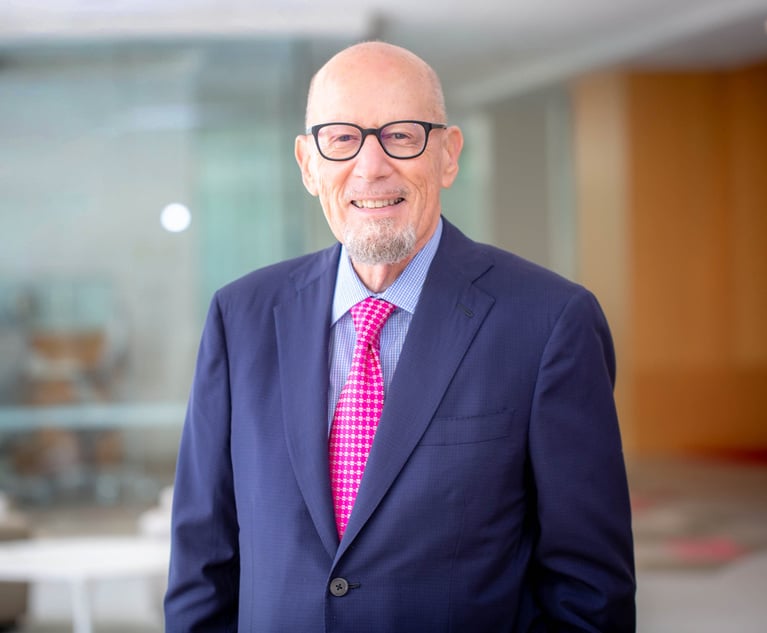Scripps GC Cynthia Gibson on Giving Clients What They Need
In a Q&A, the company's executive vice president and chief legal and business affairs officer discusses approaching legal work through a business lens and finding opportunities to develop outside of work.
March 13, 2018 at 06:00 PM
6 minute read

Editor's note: This is part of a series of Q&As with leading women in the legal profession, in honor of National Women's History Month. They were conducted and written by the legal recruiting firm Major, Lindsey & Africa.
Cynthia Gibson, executive vice president and chief legal and business affairs officer at Scripps Network Interactive, spent 20 years in private practice before making the leap in-house. “I felt as if I had done all that I could do in that arena,” she says. “I'd made partner, led a practice group and was on the management committee. I started wondering if I might be ready for a change.” She spoke with a number of close contacts about options to do something different, and one of those conversations led to talk about possibly joining Scripps Networks Interactive's legal department. She knew the quality of the people and leadership at Scripps and really admired the entrepreneurial spirit of the business. In 2009, she joined Scripps' legal team, before being named chief legal officer after participating in a nationwide search as the internal candidate.
Who helped you the most on your career path?
In my law firm, I was initially the only woman lawyer, the first woman partner and, during my time, the only woman in management, so there were not a lot of female role models for me. Early on, one of my mentors told me that you need to find your own voice, be authentic and true to yourself. I was in litigation during a time women tried to emulate men, so this advice stuck with me. Being my own person has been helpful in my success—and having a sense of authenticity is important in doing that.
Other advice that was helpful to me was to look at the business issue that brought the client to you, not just the law review article legal issues. What is the problem you are trying to solve? One of my mentors called me into his office after I wrote this memo that I thought was amazing, in which I told the client why he couldn't do what he wanted to do. My mentor said, “How is this helpful to the client? You know what business objective they want to achieve, but instead you've just said no in six different ways. Maybe suggest to them a different approach that is both compliant and achieves their business objective.” Growing up in a culture like that that has been such a benefit in the corporate setting.
Were there any moments early in your career that surprised you in terms of how you were treated? What struggles did you encounter and how did you overcome those roadblocks in your career?
As a young female lawyer, a lot of assumptions were made about me, including that I was the court reporter or secretary, and many male attorneys would call me things like “little lady.” I had two options: I could hang on to it or just let it go and realize that there is not much I can do other than work harder and smarter.
What has been your greatest challenge as the general counsel of Scripps? What keeps you up at night?
When I joined, we had a relatively small international business and now we're a truly global business. We've had to scale up our function and help the business realize the opportunities of expansion while also managing the risks associated with having significant business in multiple jurisdictions abroad. There are both cultural differences and legal differences, and you often have to take both into account. Navigating our evolution from a domestic business to a global one has been a challenge, but it has also been a tremendously rewarding experience.
How important is it to your corporation to have women in leadership?
I went from being in an environment where I was a senior woman and there were very few women around to Scripps Networks, where there are women everywhere, at every level. It's a unique and special place. Scripps is a great company and place to be a professional of any sort. It doesn't matter your gender, sexual preference or ethnicity. Our founder, Ken Lowe, values all people and Scripps still has a founder-led culture today.
How do you or your organization help women advance in the workplace and the legal profession?
As a senior woman growing up in my law firm, I felt a sense of personal responsibility to support the younger women in the firm. I've carried that with me throughout my career. I'm always willing to spend time with women who are coming up along the way. At Scripps, diversity is part of the culture and DNA, so we don't have many formal processes because we just live it.
Personally, I've been involved in a women's leadership group at United Way at the local and national levels. United Way does a fantastic job of bringing together women leaders and gathering them in a way that not a lot of other organizations do. I've learned so much about the power of bringing women together.
What advice would you give to young lawyers who desire to become a legal leader in a corporation?
Approach your legal advice through a business lens. Practical legal advice is critical, and I'm always surprised when I work with lawyers who have an ivory tower view of the law and don't translate that into how it relates to the business.
Being a person of integrity is the best long-term way to go. You start building your reputation in big and small ways from day one in your career. In hindsight, the fact that I always tried to do things the right way has paid off.
Look for leadership opportunities outside the office. You'll be very one dimensional if you only stay within the office. I got terrific leadership opportunities in the volunteer work I've done and I continue to learn things there that translate to work. Plus, I meet lots of people that I learn a huge amount from.
This content has been archived. It is available through our partners, LexisNexis® and Bloomberg Law.
To view this content, please continue to their sites.
Not a Lexis Subscriber?
Subscribe Now
Not a Bloomberg Law Subscriber?
Subscribe Now
NOT FOR REPRINT
© 2025 ALM Global, LLC, All Rights Reserved. Request academic re-use from www.copyright.com. All other uses, submit a request to [email protected]. For more information visit Asset & Logo Licensing.
You Might Like
View All
Cozen O'Connor's Bernard Nash Pioneered the Modern State AGs Practice. Now He's Hanging Up His Boots
6 minute read
'Digital Mindset': Hogan Lovells' New Global Managing Partner for Digitalization

Quiet Retirement Meets Resounding Win: Quinn Emanuel Name Partner Kathleen Sullivan's Vimeo Victory

Can a Law Firm Institutionalize Its Culture? Boies Schiller’s New Chairman Will Try
Trending Stories
- 1Uber Files RICO Suit Against Plaintiff-Side Firms Alleging Fraudulent Injury Claims
- 2The Law Firm Disrupted: Scrutinizing the Elephant More Than the Mouse
- 3Inherent Diminished Value Damages Unavailable to 3rd-Party Claimants, Court Says
- 4Pa. Defense Firm Sued by Client Over Ex-Eagles Player's $43.5M Med Mal Win
- 5Losses Mount at Morris Manning, but Departing Ex-Chair Stays Bullish About His Old Firm's Future
Who Got The Work
J. Brugh Lower of Gibbons has entered an appearance for industrial equipment supplier Devco Corporation in a pending trademark infringement lawsuit. The suit, accusing the defendant of selling knock-off Graco products, was filed Dec. 18 in New Jersey District Court by Rivkin Radler on behalf of Graco Inc. and Graco Minnesota. The case, assigned to U.S. District Judge Zahid N. Quraishi, is 3:24-cv-11294, Graco Inc. et al v. Devco Corporation.
Who Got The Work
Rebecca Maller-Stein and Kent A. Yalowitz of Arnold & Porter Kaye Scholer have entered their appearances for Hanaco Venture Capital and its executives, Lior Prosor and David Frankel, in a pending securities lawsuit. The action, filed on Dec. 24 in New York Southern District Court by Zell, Aron & Co. on behalf of Goldeneye Advisors, accuses the defendants of negligently and fraudulently managing the plaintiff's $1 million investment. The case, assigned to U.S. District Judge Vernon S. Broderick, is 1:24-cv-09918, Goldeneye Advisors, LLC v. Hanaco Venture Capital, Ltd. et al.
Who Got The Work
Attorneys from A&O Shearman has stepped in as defense counsel for Toronto-Dominion Bank and other defendants in a pending securities class action. The suit, filed Dec. 11 in New York Southern District Court by Bleichmar Fonti & Auld, accuses the defendants of concealing the bank's 'pervasive' deficiencies in regards to its compliance with the Bank Secrecy Act and the quality of its anti-money laundering controls. The case, assigned to U.S. District Judge Arun Subramanian, is 1:24-cv-09445, Gonzalez v. The Toronto-Dominion Bank et al.
Who Got The Work
Crown Castle International, a Pennsylvania company providing shared communications infrastructure, has turned to Luke D. Wolf of Gordon Rees Scully Mansukhani to fend off a pending breach-of-contract lawsuit. The court action, filed Nov. 25 in Michigan Eastern District Court by Hooper Hathaway PC on behalf of The Town Residences LLC, accuses Crown Castle of failing to transfer approximately $30,000 in utility payments from T-Mobile in breach of a roof-top lease and assignment agreement. The case, assigned to U.S. District Judge Susan K. Declercq, is 2:24-cv-13131, The Town Residences LLC v. T-Mobile US, Inc. et al.
Who Got The Work
Wilfred P. Coronato and Daniel M. Schwartz of McCarter & English have stepped in as defense counsel to Electrolux Home Products Inc. in a pending product liability lawsuit. The court action, filed Nov. 26 in New York Eastern District Court by Poulos Lopiccolo PC and Nagel Rice LLP on behalf of David Stern, alleges that the defendant's refrigerators’ drawers and shelving repeatedly break and fall apart within months after purchase. The case, assigned to U.S. District Judge Joan M. Azrack, is 2:24-cv-08204, Stern v. Electrolux Home Products, Inc.
Featured Firms
Law Offices of Gary Martin Hays & Associates, P.C.
(470) 294-1674
Law Offices of Mark E. Salomone
(857) 444-6468
Smith & Hassler
(713) 739-1250










